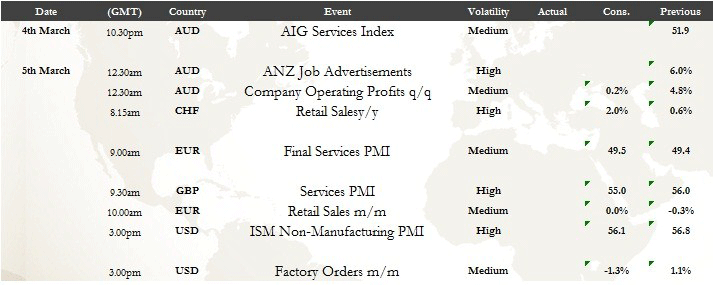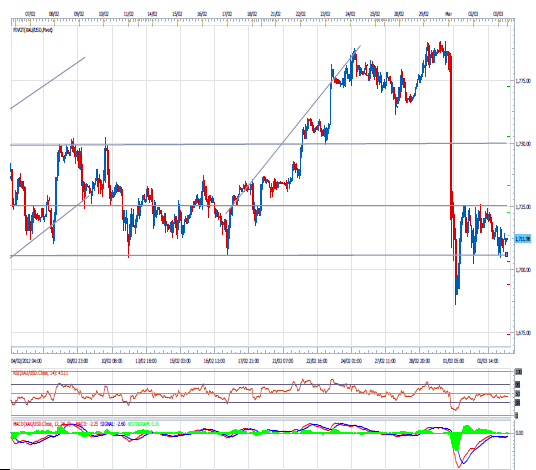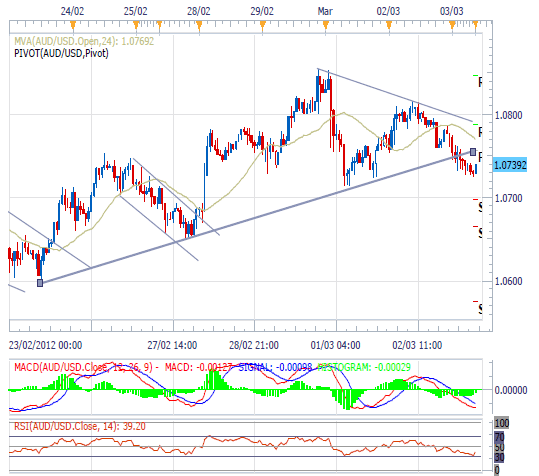The EUR fell last week as a record liquidity injection by the European Central Bank failed to boost investor confidence that the eurozone debt crisis would be alleviated by the action. A record 800 financial institutions borrowed more than EUR 529 billion. Furthermore, Spanish PM Rajoy on the weekend defied the EU fiscal pact by targeting goals outside of the agreement, undermin-ing EU credibility and once again highlighting issues surrounding the unity of European Union. German Retail Sales came in sig-nificantly lower than expected ahead of the March 9 deadline for private investors to agree on a debt swap deal with Greece. The EUR opens the week below 1.3200.
In other news, Russian Prime Minister Vladimir Putin will return to the Presidency for a six year term on the basis of preliminary results. As other nations around the world are introducing increasingly severe austerity measures, Putin has promised increased spending on social programs and the military in an effort to stem falling support and increasing social protests. The legitimacy of the result is already being questioned by opposition leaders.
The Dollar rose to nine month highs against the Japanese Yen as falling consumer prices increases speculation that the Bank of Japan will move to increase monetary easing. The Dollar rose last week as Federal Reserve Chairman Bernanke failed to mention further asset purchases in his latest statement. The market viewed his omission as a sign that the likelihood of further quantitative easing has fallen. The Dollar index gained more than 1.3% last week. EURGBP fell to its lowest levels since February 20 as the GBP strengthened on better than expected construction data. The Australian dollar opens the week at 1.0740.
US stocks rose for another week to record the best performance in the month of February since 1998 on an improving jobs mar-ket, housing data and better than expected sales numbers from companies like Ford. Consumer and financial stocks were the best performers for the week. The S&P 500 closed the last session of the week down 0.32% to 1,367. European bourses were lower with the DAX and FTSE closing 0.3% lower while Asian stocks were higher by more than 0.5%.
Commodity prices eased in a week where crude rose to above $110 on Iran conflict fears and rumours of an explosion at a Saudi pipeline and precious metals suffered heavy losses as Ben Bernanke failed to mention more QE in his latest testimony. Crude lost 2% to close at $106.70 on Friday on the back of less aggressive comments by President Obama. Precious metals continued to ease with gold down 0.7% to $1,709 while silver lost more than 3% to $34.52. Soft commodities were mixed while copper is down 0.7%. The S&P GSCI fell more than 1% to 704.37.
GOLD prices have stabilised in a $1,705 to $1,717 range on Friday after having collapse from above $1,790 to below $1,690 on Bernanke comments that gave no indication of further quantitative easing. The volatility in precious metals compared to other assets classes in response to Fed announcements may be partly explained by the increasing popularity of exchange traded products. Investments in ETPs have risen so much that gold holdings in ETPs have now surpassed the holdings of Italy and France and are now only below the holdings of the US, Germany and the International Monetary Fund. We expect that although price swings and volatility in gold may in fact increase even as liquidity improves as investors move towards ETPs instead of the more costly option of physical holdings in the metal. We expect gold to continue to trade in a $1,705 to $1,720 range this week and will be looking at short term trading opportunities to take advantage of this range.
![]()
AUD/USD was mostly quiet for the last Asia trading session for the week on Friday with the price stuck around 1.0785. Early commodity related currency weakness during the European morning got the price moving with 1.0750 bids tested. It wasn’t until the Spain news turned the risk sentiment clearly into the negative with the price breaking below the earlier support by momentum sellers. However, they couldn’t do what was seen in the Euro fall with little real interest for the pair and commodity currencies ahead of the weekend. Talk of AUDJPY buying on the dip could have been a factor but at this stage unconfirmed. ANZ Job Ads are due shortly with last months positive 6% looking like an unreachable target this month. Continued fears over Greece and slowing of the local economy should keep the result closer to zero with the AUD remaining under pressure. Continued weakness is needed for the Euro to drive the AUD back towards 1.05 or lower over the next week or two. 
![]()
- English (UK)
- English (India)
- English (Canada)
- English (Australia)
- English (South Africa)
- English (Philippines)
- English (Nigeria)
- Deutsch
- Español (España)
- Español (México)
- Français
- Italiano
- Nederlands
- Português (Portugal)
- Polski
- Português (Brasil)
- Русский
- Türkçe
- العربية
- Ελληνικά
- Svenska
- Suomi
- עברית
- 日本語
- 한국어
- 简体中文
- 繁體中文
- Bahasa Indonesia
- Bahasa Melayu
- ไทย
- Tiếng Việt
- हिंदी
Compass Directions Report - 5 March 2012
Published 03/05/2012, 04:36 AM
Updated 07/09/2023, 06:31 AM
Compass Directions Report - 5 March 2012
Latest comments
Loading next article…
Install Our App
Risk Disclosure: Trading in financial instruments and/or cryptocurrencies involves high risks including the risk of losing some, or all, of your investment amount, and may not be suitable for all investors. Prices of cryptocurrencies are extremely volatile and may be affected by external factors such as financial, regulatory or political events. Trading on margin increases the financial risks.
Before deciding to trade in financial instrument or cryptocurrencies you should be fully informed of the risks and costs associated with trading the financial markets, carefully consider your investment objectives, level of experience, and risk appetite, and seek professional advice where needed.
Fusion Media would like to remind you that the data contained in this website is not necessarily real-time nor accurate. The data and prices on the website are not necessarily provided by any market or exchange, but may be provided by market makers, and so prices may not be accurate and may differ from the actual price at any given market, meaning prices are indicative and not appropriate for trading purposes. Fusion Media and any provider of the data contained in this website will not accept liability for any loss or damage as a result of your trading, or your reliance on the information contained within this website.
It is prohibited to use, store, reproduce, display, modify, transmit or distribute the data contained in this website without the explicit prior written permission of Fusion Media and/or the data provider. All intellectual property rights are reserved by the providers and/or the exchange providing the data contained in this website.
Fusion Media may be compensated by the advertisers that appear on the website, based on your interaction with the advertisements or advertisers.
Before deciding to trade in financial instrument or cryptocurrencies you should be fully informed of the risks and costs associated with trading the financial markets, carefully consider your investment objectives, level of experience, and risk appetite, and seek professional advice where needed.
Fusion Media would like to remind you that the data contained in this website is not necessarily real-time nor accurate. The data and prices on the website are not necessarily provided by any market or exchange, but may be provided by market makers, and so prices may not be accurate and may differ from the actual price at any given market, meaning prices are indicative and not appropriate for trading purposes. Fusion Media and any provider of the data contained in this website will not accept liability for any loss or damage as a result of your trading, or your reliance on the information contained within this website.
It is prohibited to use, store, reproduce, display, modify, transmit or distribute the data contained in this website without the explicit prior written permission of Fusion Media and/or the data provider. All intellectual property rights are reserved by the providers and/or the exchange providing the data contained in this website.
Fusion Media may be compensated by the advertisers that appear on the website, based on your interaction with the advertisements or advertisers.
© 2007-2025 - Fusion Media Limited. All Rights Reserved.
